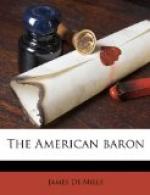“I knew the face; didn’t you, Kitty dear?” said Minnie. “It’s so easy to tell it. It was Scone Dacres. But what in the world does he want? Oh dear! I hope he won’t bother me.”
CHAPTER XVI.
THE INTRUDER.
Judging from the Baron’s own words, it will be perceived that his comprehension of the situation was a little different from the actual fact. His idea was that his last letter had been received by Minnie in England, whereupon she had been seized with such an ungovernable longing to see him that she at once set out for Rome. She had not sent him any message, for she wished to surprise him. She had done so effectually. He was not merely surprised; he was overwhelmed, overjoyed, intoxicated with joy. This was indeed kind, he thought—the true part of a fond girl, who thus cast aside all silly scruples, and followed the dictates of her own noble and loving heart.
Now the fact that he had made a partial failure of his first visit to his charmer did not in the slightest degree disconcert him. He was naturally joyous, hilarious, and sanguine. His courage never faltered, nor could the brightness of his soul be easily dimmed. A disappointment on one day gave him but little trouble. It was quickly thrown off, and then his buoyant spirit looked forward for better fortune on the next day. The little disappointment which he had did not, therefore, prevent him from letting his reason feast and his soul flow with Lord Hawbury; nor, when that festive season was over, did it prevent him from indulging in the brightest anticipations for the following day.
On the afternoon of that day, then, the Baron directed his steps toward the hotel where his charmer resided, his heart beating high, and the generous blood mantling his cheek, and all that sort of thing. But the Baron was not alone. He had a companion, and this companion was an acquaintance whom he had made that morning. This companion was very tall, very thin, very sallow, with long, straggling locks of rusty black hair, white neck-tie, and a suit of rather seedy black clothes. In fact, it was the very stranger who had been arrested almost under his eyes as a Garibaldian. His case had come under the notice of the Baron, who had visited him, and found him not to be a Garibaldian at all, but a fellow-countryman in distress—in short, no less a person than the Reverend Saul Tozer, an esteemed clergyman, who had been traveling through Europe for the benefit of his health and the enlargement of his knowledge. This fellow-countryman in distress had at once been released by the Baron’s influence; and, not content with giving him his liberty, he determined to take him under his protection, and offered to introduce him to society; all of which generous offices were fully appreciated by the grateful clergyman.
The Baron’s steps were first directed toward the place above mentioned, and the Reverend Saul accompanied him. On reaching it he knocked, and asked for Miss Fay.




